9 Hard Questions You’ll Get in Your Exit Interview
The most common questions, red flags to look out for, and how to prepare.
Regardless of why you're leaving a company, an exit interview can be a source of great stress. You know that touchy subjects (like your reason for leaving) will be discussed, but you probably don't know what else will be asked or how to present yourself.
Or, maybe you don't even know if you want to attend an exit interview in the first place.
This article will help you tackle an exit interview the right way, from making the decision to attend to having the best experience possible. But before we dive in...
What Is an Exit Interview?
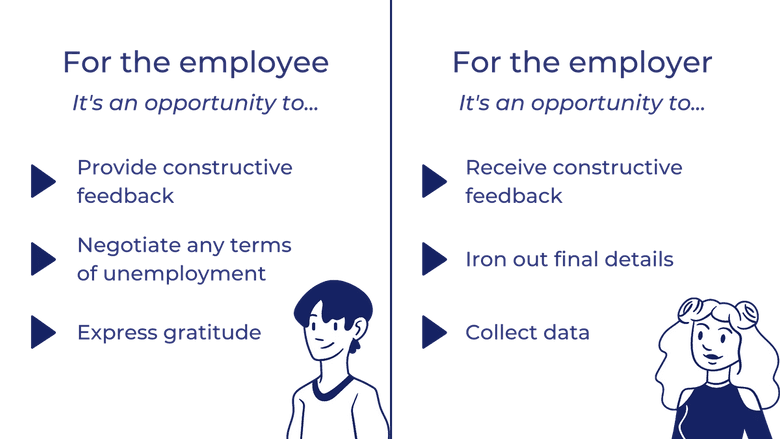
In simplest terms, this is an interview conducted upon an employee's separation from an organization. While it may be replaced with an online survey in some cases, it usually takes the form of a one-on-one, face-to-face conversation.
From the departing employee's side, it's an opportunity to provide constructive feedback, express gratitude, and negotiate any terms of unemployment. From the employer's side, it's an opportunity to receive constructive feedback, collect data, and iron out the final details of the employee's departure.
5 Things to Consider Before You Do an Exit Interview
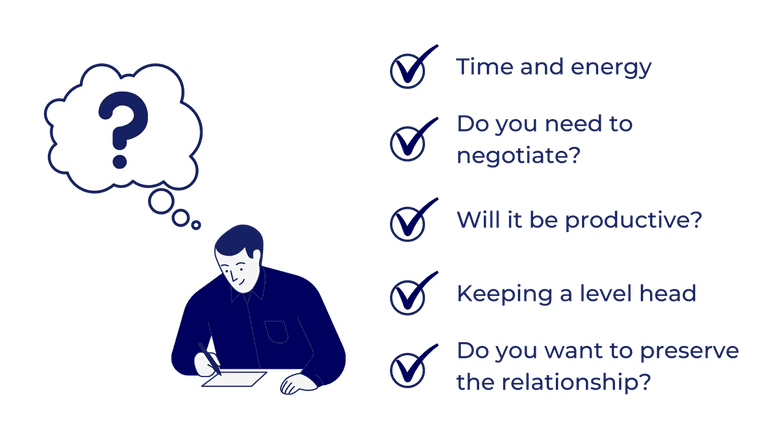
Depending on your mindset, an exit interview can be an enriching experience for both you and your employer.
Here are a few factors to consider before moving forward:
If you decide to turn down an exit interview...
That's perfectly alright. Thank your employer for the opportunity and express your intention to pass on the exit interview experience.
If you'd like, you can state a reason, like overwhelm during this transitional period, or a belief that you've already given all the feedback you have. Alternatively, you could leave them without an explanation, and simply wish them well.
Regardless of which approach you take, be sincere and hold your ground. Unless it's explicitly stated in your employment contract, an employer can't force you to participate, so don't let them pressure you without cause.
9 Most Common Questions

For the most part, an exit interview is designed to gather data and feedback from exiting employees. Therefore, while practices vary slightly across companies, the general line of questioning will remain the same.
Why they ask this: To understand what was initially dissatisfying about the position or company. This will help them identify patterns of dissatisfaction, fix (or hide) them, and improve employee retention down the line.
Why they ask this: To compare their standards and practices with competing firms. They want to understand what edge other companies have, and where they might be lacking.
Why they ask this: To learn how they can improve the position (so your replacement will stick around).
Why they ask this: To identify trends, both positive and negative, regarding the cultural experience in the organization. Over time, these will be examined and concerns will be addressed.
Why they ask this: To identify a potential source of dissatisfaction and keep tabs on the management team. If trends are identified (i.e. half of a manager's team quit in 6 months), the problem may be traced to the leader instead of the company.
Why they ask this: To ensure that you were well prepared to do your job and given room to grow, improve, and expand your knowledge/skills. "Lack of growth opportunities" is a common reason an employee leaves a company.
Why they ask this: To expand the positive aspects and (hopefully) limit the negative aspects of the role for your replacement. This also gives you a very clear opportunity to provide constructive feedback on your experience.
Why they ask this: To get to the root of your dissatisfaction. Since they're essentially asking for negative feedback, choose your words carefully and frame this as an opportunity for company growth (not an attack on their existence).
Why they ask this: To (a) hint that you're an excellent employee who they hope to see again someday, and (b) identify changes that need to be made to retain top talent.
Other potential topics include (but are not limited to)...
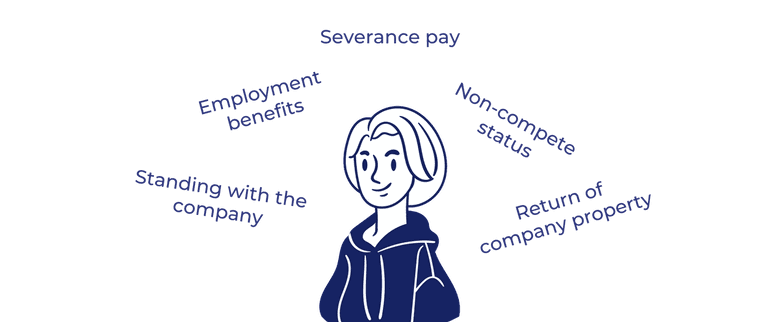
Severance pay: This is common if you're a long-term employee, or if you're being laid off for reasons other than performance. Remember that severance pay is negotiable!
Employment benefits: This includes health insurance, 401K policies, accrued vacation, compensation, and more. Health insurance and 401Ks will have to be transitioned to a new employer-- figure out how and when, or negotiate for benefits coverage while you look for a new job. Additionally, you should figure out compensation-related issues. Understand how you're being reimbursed for unused vacation, and what happens to any bonuses and equity that were contingent upon your employment. In many cases, these factors are also negotiable.
Non-compete status: If you signed a non-compete agreement at the start of your employment, it may be discussed or reassessed during the exit interview. Your employer will be more willing to negotiate if you're being laid off, and less willing if you're leaving the company to pursue a better offer.
Return of company property: If you're in possession of company property, be it a laptop or a vehicle, you will likely be expected to return it. Be sure to understand when and how this process should be completed. In rare cases, you may be able to negotiate to keep company property, depending on what it is and why you want it.
Standing with the company: This includes a company's willingness to recommend you to others (i.e. writing reference letters) and your rehireability. The nature of your departure and your behavior as an employee will likely influence your standing. Your behavior during an exit interview can also have sway over this, which is why it's important to be composed and professional!
Red Flags to Look Out For
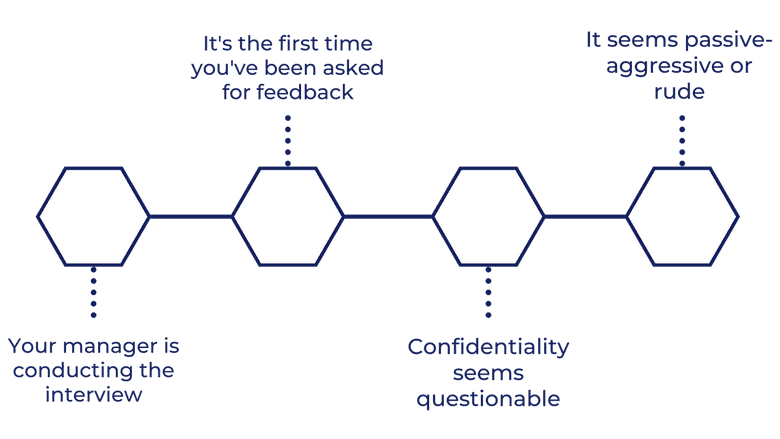
🚩 Your manager is conducting the interview
This may dissuade you from providing honest feedback, and any decent HR department understands that. If a manager is set to conduct exit interviews for their direct reports, the company may be trying to silence exiting employees.
🚩 This is the first time you've been asked for feedback
If feedback isn't built into the company's governance, then the chances they actually care about an employee's experience are low. The exit interview is probably a formality and therefore a waste of your time. If your feedback hasn't mattered before, it won't matter when you leave the company either.
🚩 The confidentiality of the process seems questionable
Be sure to ask if your feedback will remain anonymous and how the HR department defines anonymity. For example, some companies will share feedback on a need-to-know basis. Therefore, the more people or issues you talk about, the more people will hear about your exit interview. If the chain of sharing seems a bit too long or murky, it may be best to avoid the interview altogether and protect your reputation.
🚩 The exit interview request seems passive-aggressive, rude, or otherwise unnerving
If the process seems hostile from the beginning, you're probably in for an unpleasant interview. If you attempt to turn down the interview and the hostility continues, cut off communications as quickly and professionally as possible. It isn't worth stooping to the company's level, especially if they've already decided to cast you in a negative light.
How Do I Have a Positive Exit Interview Experience?
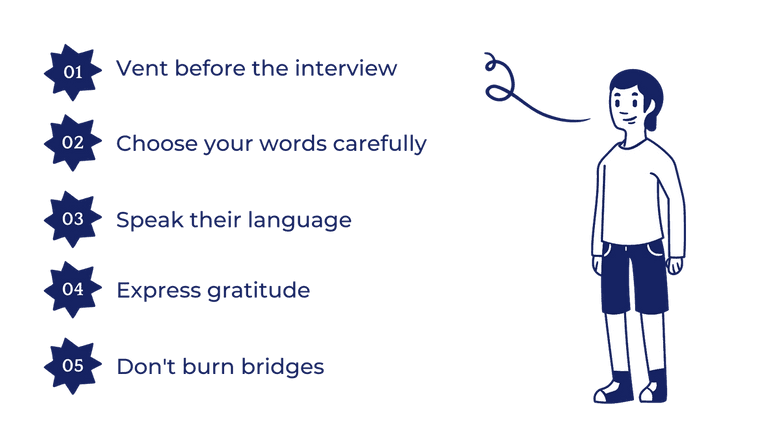
1. Vent before the interview
If you have some bones to pick with company policy, culture, practices, or specific employees, an exit interview is not the time to do it.
Be sure to vent to a trusted friend or colleague ahead of time. Use that conversation to sort out your thoughts and feelings regarding your time with the company. This will keep the exit interview from turning into an argument (or therapy session) and increase your chances of having a calm, productive conversation.
2. Choose your words carefully
Since there's no way to be certain of every exit interview question, it's impossible to script the entire interaction. However, between reading this guide and talking to ex-employees, you should have a general idea of how the process will look.
Before the interview, carefully think through your responses to commonly asked questions. When outlining potential responses, be aware of the language you use, especially surrounding negative feedback.
If this is a relationship you want to preserve, be sure to come across as genuine, concerned, and helpful, rather than bitter or aggressive.
3. Speak their language
If you want your feedback to be taken into account, it's essential that you speak in terms employers understand. It's all about how you frame your points. Focus on:
Fact-based arguments: The core purpose of these interviews is to collect data. Instead of taking an emotional approach to your critique, back your arguments up with easily digestible facts. For example: instead of saying "I'm leaving because my manager is the worst human being ever", try something like:
"I'm leaving because my manager was unclear about my responsibilities, difficult to reach, and passive aggressive when I asked for help. Here are (training documents, email receipts, text communications, etc) that prove my point."
While evidence isn't necessary, it solidifies your argument and provides concrete data points for your interviewer.
Company-centric feedback: The data from these interviews is meant to drive company improvement somewhere down the line. Therefore, an interviewer is more likely to listen to exit interview feedback if it comes from a place of genuine concern for the company/a desire to improve it. For example: instead of saying "I had a horrible experience in your training program", try something like:
"Based on my experience, I think new employees could benefit from a training program that....".
By presenting your points as opportunities instead of criticisms, the interviewer is less likely to get defensive, and the feedback is more likely to be considered.
4. Express gratitude
Incorporate some positive feedback into your interview. Talk about the things you enjoyed about your role, team, or overall experience. Give thanks for the opportunities the company gave you, or the ways in which they helped you grow.
Additionally, be sure to thank the interviewer for listening before you leave. This may seem small, but it will ensure that you sprinkle some positivity throughout the interview and end it on a high note.
5. Don't burn bridges
All of the above tips carry this overarching theme. Why? Because anything you say in an exit interview can be held against you. If you behave poorly, your reputation may be damaged, you may be barred from future opportunities with the company, or your future jobs may be impacted (i.e. if they call for a reference or find out about your rehireability status, both of which will be damaged if you act out).
Therefore, if you choose to attend an exit interview, remain polite, calm, and professional throughout. Walk out of the room on good terms with your employer, even if you had a bad experience as their employee.
The information provided herein is for general informational purposes only and is not intended to provide tax, legal, or investment advice and should not be construed as an offer to sell, a solicitation of an offer to buy, or a recommendation of any security by Candor, its employees and affiliates, or any third-party. Any expressions of opinion or assumptions are for illustrative purposes only and are subject to change without notice. Past performance is not a guarantee of future results and the opinions presented herein should not be viewed as an indicator of future performance. Investing in securities involves risk. Loss of principal is possible.
Third-party data has been obtained from sources we believe to be reliable; however, its accuracy, completeness, or reliability cannot be guaranteed. Candor does not receive compensation to promote or discuss any particular Company; however, Candor, its employees and affiliates, and/or its clients may hold positions in securities of the Companies discussed.
